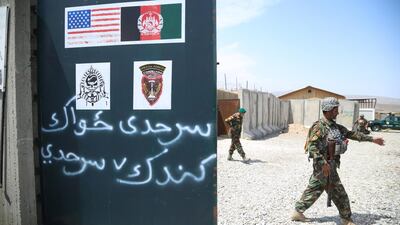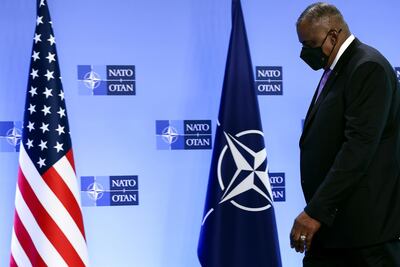Speaking to The National at her child's grave in Kabul, 38-year-old Wahida Shirzad lamented that "no matter what happens in Afghanistan – whether there is war or peace – no one will be able to bring back my son". Mohammad Rahid Amin was one of 22 students killed when terrorists stormed Kabul University in November 2020.
The attack typifies the danger and heartache that Afghans have lived with for decades. Despite a 20-year US-led war, the Taliban, the main killers of innocent Afghans, seem to be winning. American talks with the group over the past year gave the terrorists far more than they granted in return. Throughout, the concerns of Afghanistan's government were largely marginalised.
Now, the very future of the administration in Kabul is in doubt, after US President Joe Biden announced that he is withdrawing all 2,500 American troops from the country by September 11, 2021 without conditions. Soldiers from other Nato countries are expected to leave along with them. Mr Biden's chosen date is the 20th anniversary of 9/11. Shortly after Al Qaeda's attack, the US toppled a Taliban regime in Afghanistan, which was hosting the terror group.
The decision will end the longest war in US history. But it will not necessarily finish Afghanistan's war, which is increasingly becoming one of civil strife. Its conclusion will not see an end to the group's resurgence in areas the Afghan National Army and its international allies worked to liberate. Nor will it safeguard the many Afghans who justifiably fear a Taliban takeover.
Winding down military support does not stop Mr Biden's duty of care towards Afghanistan. After two decades of deep involvement in the country's security, government and development, there is no such thing as a responsible clean break.
America is leaving with a mixed legacy and mixed feelings from Afghans.
It is possible that Washington will not abide by the September timetable. An initial May deadline for withdrawal that was set by former president Donald Trump was swiftly overturned by Mr Biden when he entered office, and this was not the first time the US rescinded strategic decisions in Afghanistan. But no one can bank on a second U-turn. An increasing number of American citizens and politicians are pushing for an end to "forever wars". For them, Afghanistan is the definition of one.
In the face of this, the government in Kabul must quickly form a united front against the Taliban and other militia groups that threaten Afghanistan. But it will still need the US to fulfil its own responsibilities. If American troops go, they must be replaced with a generous supply of military aid. Without it, the country will be overrun.
The West has occasionally been rocked by terrorist attacks in recent years, some from groups that operate in Afghanistan. For Afghans, the tragedy is not occasional. In the first three months of 2021, their country saw almost 600 civilians killed.
Afghanistan remains vulnerable. But so will the West, if along with its soldiers, it also withdraws its sense of responsibility.



